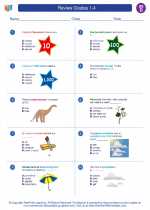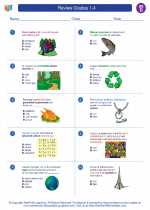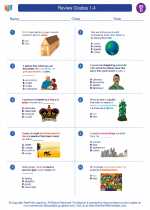Climate: Explained
Climate refers to the long-term patterns and averages of temperature, precipitation, humidity, and wind in a specific area. It is different from weather, which describes short-term atmospheric conditions.
Factors Affecting Climate
- Latitude: The distance from the equator affects the amount of sunlight an area receives, which in turn influences temperature and climate.
- Altitude: Higher altitudes generally have cooler temperatures due to lower air pressure.
- Proximity to Water: Coastal areas experience milder climates due to the moderating effects of water bodies.
- Ocean Currents: Ocean currents can affect the climate of coastal regions by bringing warm or cold water to the area.
- Wind Patterns: Prevailing wind patterns can influence temperature, humidity, and precipitation in an area.
- Topography: Features such as mountains and valleys can create microclimates within a larger region.
Climate Types
There are several main climate types, including:
- Tropical: Hot and humid climates found near the equator.
- Temperate: Moderate climates with distinct seasons, found in the mid-latitudes.
- Desert: Arid climates with little precipitation.
- Continental: Climates with hot summers and cold winters, found in the interior of continents.
- Polar: Cold climates found near the poles.
Climate Change
Climate change refers to long-term shifts in temperature, precipitation, and other climate patterns, often attributed to human activities such as the burning of fossil fuels and deforestation. It has significant impacts on ecosystems, agriculture, and weather patterns.
Studying Climate
To study climate, scientists use various tools and methods, including:
- Temperature and Precipitation Records: Long-term data collection helps identify climate trends.
- Satellite Observations: Satellites provide a comprehensive view of global climate patterns.
- Climate Models: Computer models simulate climate systems to understand past and future climate changes.
- Ice Core Analysis: Examining ice cores from glaciers provides historical climate data.
Understanding climate is crucial for making informed decisions about land use, resource management, and environmental conservation.
[Climate] Related Worksheets and Study Guides:
.◂Social Studies Worksheets and Study Guides Fourth Grade. Review Grades 1-4
The resources above cover the following skills:
National Curriculum Standards for Social Studies (NCSS)
CULTURE
SOCIAL STUDIES PROGRAMS SHOULD INCLUDE EXPERIENCES THAT PROVIDE FOR THE STUDY OF CULTURE AND CULTURAL DIVERSITY.
KNOWLEDGE - Learners will understand:
'Culture'' refers to the behaviors, beliefs, values, traditions, institutions, and ways of living together of a group of people.
Concepts such as: similarities, differences, beliefs, values, cohesion, and diversity.
How cultural beliefs, behaviors, and values allow human groups to solve the problems of daily living.
How culture may change in response to changing needs and concerns.
How peoples from different cultures develop different values and ways of interpreting experience.
PROCESSES - Learners will be able to:
Ask and find answers to questions related to culture in the contexts of school, community, state, and region.
Explore and describe similarities and differences in the ways various cultural groups meet similar needs and concerns.
Demonstrate how holding different values and beliefs can contribute or pose obstacles to understanding between people and groups.
TIME, CONTINUITY, AND CHANGE
SOCIAL STUDIES PROGRAMS SHOULD INCLUDE EXPERIENCES THAT PROVIDE FOR THE STUDY OF THE PAST AND ITS LEGACY.
KNOWLEDGE - Learners will understand:
Key symbols and traditions that are carried from the past into the present by diverse cultures in the United States and world.
PEOPLE, PLACES, AND ENVIRONMENTS
SOCIAL STUDIES PROGRAMS SHOULD INCLUDE EXPERIENCES THAT PROVIDE FOR THE STUDY OF PEOPLE, PLACES, AND ENVIRONMENTS.
KNOWLEDGE - Learners will understand:
Physical changes in community, state, and region, such as seasons, climate, and weather, and their effects on plants and animals.
Benefits and problems resulting from the discovery and use of resources.
Factors that contribute to similarities and differences among peoples locally and in places across the world, including ethnicity, language, and religious beliefs.
INDIVIDUALS, GROUPS, AND INSTITUTIONS
SOCIAL STUDIES PROGRAMS SHOULD INCLUDE EXPERIENCES THAT PROVIDE FOR THE STUDY OF INTERACTIONS AMONG INDIVIDUALS, GROUPS, AND INSTITUTIONS.
KNOWLEDGE - Learners will understand:
Concepts such as: community, culture, role, competition, cooperation, rules, and norms.
GLOBAL CONNECTIONS
SOCIAL STUDIES PROGRAMS SHOULD INCLUDE EXPERIENCES THAT PROVIDE FOR THE STUDY OF GLOBAL CONNECTIONS AND INTERDEPENDENCE.
KNOWLEDGE - Learners will understand:
Global connections may be of various types (e.g., cultural exchange, trade, political, economic, or travel).
Global connections affect daily life for individuals and those around them.
The pace of global change has quickened in recent times.
PROCESSES - Learners will be able to:
Ask and find answers to questions about the connections we have to other people and places around the globe.
Identify examples of global connections in their community, state, or region.
Describe examples in which language, art, music, belief systems, and other cultural elements can facilitate global understanding or cause misunderstanding.
National Standards for Civics and Government (NSCG)
What is Government and What Should It Do? What are the differences between limited and unlimited governments?
Limited and unlimited governments: Students should be able to explain the basic differences between limited and unlimited governments. To achieve this standard, students should be able to
Explain that an unlimited government is one in which there are no effective controls over the powers of its rulers, who cannot be easily removed from office by peaceful, legal means, e.g., governments run by dictators
National Content Standards in Economics (NCSE)
Scarcity
Students will understand that productive resources are limited. Therefore, people cannot have all the goods and services they want; as a result, they must choose some things and give up others. Students will be able to use this knowledge to identify what they gain and what they give up when they make choices.
At the completion of Grade 4, students will know that:
Natural resources, such as land, are “gifts of nature;” they are present without human intervention.
National Center for History in Schools (NCHS)
Historical Thinking Standards
Chronological Thinking
Distinguish between past, present, and future time.
Topic 1: Living and Working Together in Families and Communities, Now and Long Ago
Family life now and in the recent past; family life in various places long ago.
The student understands the different ways people of diverse racial, religious, and ethnic groups, and of various national origins have transmitted their beliefs and values.



